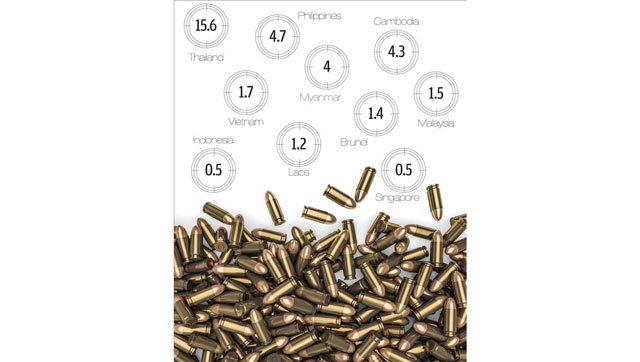The Philippines’ protection paradox claims more lives as the black market in weapons thrives
By Rebecca Foster
Celebratory gunfire echoed across the Manila suburb as residents revelled in New Year festivities in December. But tradition turned to tragedy when a stray bullet hit seven-year-old Stephanie Nicole Ella in the head.

Her death reignited fierce debate over gun control in the Philippines, a country whose enthusiastic gun culture rivals that of the United States. Home to 3.9 million privately owned firearms, the archipelagic nation has one of the highest gun ownership rates in Southeast Asia and a high incidence of violent crime. In January, a ten-minute-long shootout linked to a gambling turf war left 13 dead in Quezon, among them corrupt police and military officers. A few days later, a drug-crazed gunman killed seven people in a slum rampage in Cavite.
Last month the government stepped up its drive against gun crime when President Benigno Aquino passed legislation making it harder for individuals to own firearms. Those seeking gun permits will have to undergo drug and psychological tests, attend a gun safety seminar and prove they have a clean criminal record.
It remains to be seen whether the legislation will be enough to cap the country’s enormous and lucrative weapons black market. Selling for as little as $120, there are about 600,000 ‘loose’ guns in circulation in the country, according to police data. However, Ed Quitoriano, a security analyst based in the Philippines, has said this figure could be as high as four million. While the exact figure is unknown, it is clear that these illegal firearms lie at the heart of the country’s growing gun problem.
“Loose and illegal firearms contribute substantially to the crime problem in the Philippines,” said Ernesto Tabujara, acting secretary general of Progun Philippines, a firearms advocacy group. “Of the total number of gun crimes, about 99.9% are committed using illegal firearms.”
In the first six months of 2013, Progun Philippines recorded more than 16,800 violent crimes.
Gun culture in the Philippines can be traced back centuries and is linked to the country’s turbulent political scene. Perhaps the worst example of politically motivated violence in the country’s recent history was the 2009 Maguindanao massacre, when members of the Amputan ethnic clan gunned down more than 50 people in the southern province of Mindanao in the lead up to the 2010 general election.
“The conventional wisdom here is that politics is ruled by the three Gs – guns, goons and gold,” said Carlos Conde, a researcher for Human Rights Watch in the Philippines, adding that the political landscape in the country borders on feudalism. “Political players maintain their power either through corruption or intimidation, and guns play a key role in making sure that is achieved.”
It is easier for such politicians to solidify their power through violence in provincial areas, where the overly stretched arm of the law barely casts a shadow. Indeed, the state’s inability to enforce the law outside of the main cities has helped to breed a culture of fear, prompting people to purchase firearms to defend themselves and their families.
Recent research by Pulse Asia, a public opinion polling body, shows that Manilans are more inclined to support tighter gun restrictions than their counterparts in Mindanao and the Visayas region, two parts of the country where insurgencies and clan violence prevail.
“A number of ongoing insurgencies create a demand for guns, as well as encourage people with the capacity to produce guns to produce them,” said Dr Justin Hastings, a senior lecturer in international relations and comparative politics at the University of Sydney. He added that guns are produced illegally across the country’s vast archipelago. “Whereas in other countries guns are often produced in a few select locations.”
Aquino’s recent high-profile campaign to clear the streets of unlicenced weapons may have netted fewer than 2,200 firearms, but the countrywide five-month ban on carrying firearms in public in the lead-up to and following the May general election has been called a huge success.
“During the imposition, the incidence of crime fell by nearly 70% as compared to the same period in 2009,” said Noman Cabrera, secretary general of the Ang Kapatiran Party, a church-based political group. “The most simple and practical solution [to gun crime] is to prohibit [civilians] from carrying firearms in public.”
As good an idea as a gun ban may be in principle, any measures will be useless unless the government addresses the colossal proliferation of unregistered guns, says Human Rights Watch’s Conde. Until then, the country’s firearms frenzy will continue to claim lives.
It runs in the family
Violent resistance to political dynasties in the Philippines dates back to the pre-Spanish Maharlika period, when local elites ruled fragmented islands, holding on to power at any cost. These political monopolies became institutionalised under Spanish rule, which started in 1521, and continued under the Americans from 1898 until 1946. When the Japanese withdrew from the country at the end of the Pacific War, they left behind a sea of arms that was quickly absorbed into island life. Gun violence became further entrenched during the bloody, 20-year dictatorship of Ferdinand Marcos. Following the 1986 revolution that ousted the ruthless leader, violence worsened as Manila lost control of provincial areas. Local clans became more powerful and, in the 21st century, most violence is rooted in provincial political rivalries, with the spoils of public office a lucrative seductress.
Also view:
“All quiet on the southern front?” – Filipinos displaced by war look forward to returning home
“Locked ‘n’ loaded” – A series of high-profile shooting sprees has prompted a temporary tightening of gun laws in the Philippines in the run up to national elections
“Seeking a protector” – Only the rich in Thailand can afford to scratch an itchy trigger finger
